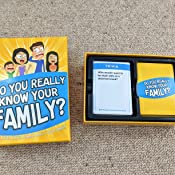
Contents
Do You Really Know Your Family Game? Think you know everything there is to know about them? We all like to think we know our loved ones inside and out, but the truth is, we don’t always know as much as we think.
To find out how much you really know about your clan, try playing the “Do You Really Know Your Family” game.
Do You Really Know Your Family Game We all like to think we know our families pretty well? After all, we’ve lived with them our whole lives!
But how well do you really know your family? Test your knowledge with this fun game! The rules are simple: I’ll give you a series of questions about your family members, and you have to answer them as quickly and accurately as possible.
The catch? The questions will get progressively more difficult – and personal – as we go along. So let’s see how much you really know about your loved ones!
1. What is your mother’s maiden name?
2. What is your father’s middle name? 3. How many brothers and sisters does each parent have?
4. What are the birthdays of each grandparent?
5. What is your favorite childhood memory with each grandparent?
6. Where was each parent born?
7. In what city did each set of grandparents live when they were married?
8. If any, who are the godparents of each sibling or yourself? Bonus Round: Can you name one thing that would surprise people to learn about each immediate family member (e.g., my dad can speak fluent French)?

Credit: buyolympia.com
What is the Do You Really Know Your Family Game
Do You Really Know Your Family is a board game that was created in 2006 by Hasbro? The game is designed for players to learn interesting facts about their family members. The game can be played with two to four players and takes approximately one hour to play.
Players start the game by taking turns rolling the dice and moving around the board. When a player lands on a space, they draw a card from the deck and answer a question about one of their family members. If they answer correctly, they get to keep the card; if they answer incorrectly, the other players get to take turns asking them questions until someone gets it right.
The first player to collect 10 cards wins the game! This is a great way for families to learn more about each other and have some fun at the same time. So break out Do You Really Know Your Family next time you’re looking for something new and exciting to do together!
How Do You Play the Game
The game is played with a regular deck of 52 cards. The object of the game is to remove all of the cards from your hand, and the first player to do so wins the game. To start, each player is dealt 7 cards face down.
The remaining cards are placed face down in the middle of the players, forming a draw pile. The top card of the draw pile is turned over to begin a discard pile. Players take turns drawing one card from either the draw pile or the top of the discard pile and discarding one card onto the discard pile.
Cards of matching rank may be discarded in sets of two or more. For example, if an 8 is on top of the discard pile, any player may choose to play two 4s from his hand onto it since 8 = 4+4. If there are no legal plays available, then you must draw a card from the draw pile and pass your turn.
Aces are low (1) and kings are high (13). There are no jokers or other wildcards used in this game. When playing with 3-5 players, 2s and 10s are removed from play; when playing with 6-7 players only 2s are removed; when playing only two people play with a 54-card deck including two jokers which act as additional wildcards that can match any other card’s rank).
Winning hands accumulate points based on certain criteria: if all but one player has run out of cards during a round (a “sweep”), that player scores 1 point for each card left in opponents’ hands; if none sweep then the person who went out scores 1 point per card held by opponents plus 20 points; going out on last possible move (“going gin”) scores 25 points plus opponent’s score; knocking early (“undercutting”) when able opponent could have gone gin scores opponent’s score plus 10 points plus value difference between deadwood counts.. Winning: First person to reach 100 points (or some other mutually agreed upon score) wins the entire pot accumulated during that particular game.
What is the Goal of the Game
The goal of the game is simple: to score as many points as possible. There are a few ways to do this, but the most common is to shoot the ball through the hoop. Points are also awarded for making free throws, or shots from the foul line.
How Can I Win the Game
There is no one-size-fits-all answer to this question, as the best way to win any given game depends on the specific rules and objectives of that game. However, there are some general tips and strategies that can help you increase your chances of winning any game you play.
To start with, it is important to understand the objective of the game and what you need to do in order to win.
Once you know this, you can develop a strategy for achieving your goal. For example, if the objective is to score the most points, then you will want to focus on activities that will earn you points while avoiding actions that will cost you points.
In addition to knowing the objective, it is also helpful to be aware of any special rules or conditions that could impact your ability to win.
For instance, some games may have time limits in which case you will need to work quickly and efficiently in order to succeed. Others may require players to take turns so planning ahead can give you a significant advantage.
Of course, even with the best strategy, there is always an element of luck involved in winning any game.
However, by being prepared and knowledgeable about the game you are playing, you can put yourself in a much better position to come out victorious.
Playing the do you really know your family game
Conclusion
In the game of life, it’s easy to think we know everything about our family members. After all, we’ve lived with them for years and seen them at their best and worst moments. But do we really know them?
A new blog post from Do You Really Know Your Family Game challenges us to think again. The author asks readers to consider how well they know their siblings, parents, grandparents, cousins, and other relatives. They suggest asking questions about childhood memories, favorite foods, biggest fears, and more – things that go beyond the usual small talk.
By learning more about our family members, we can better appreciate them for who they are and deepen our connection to them.